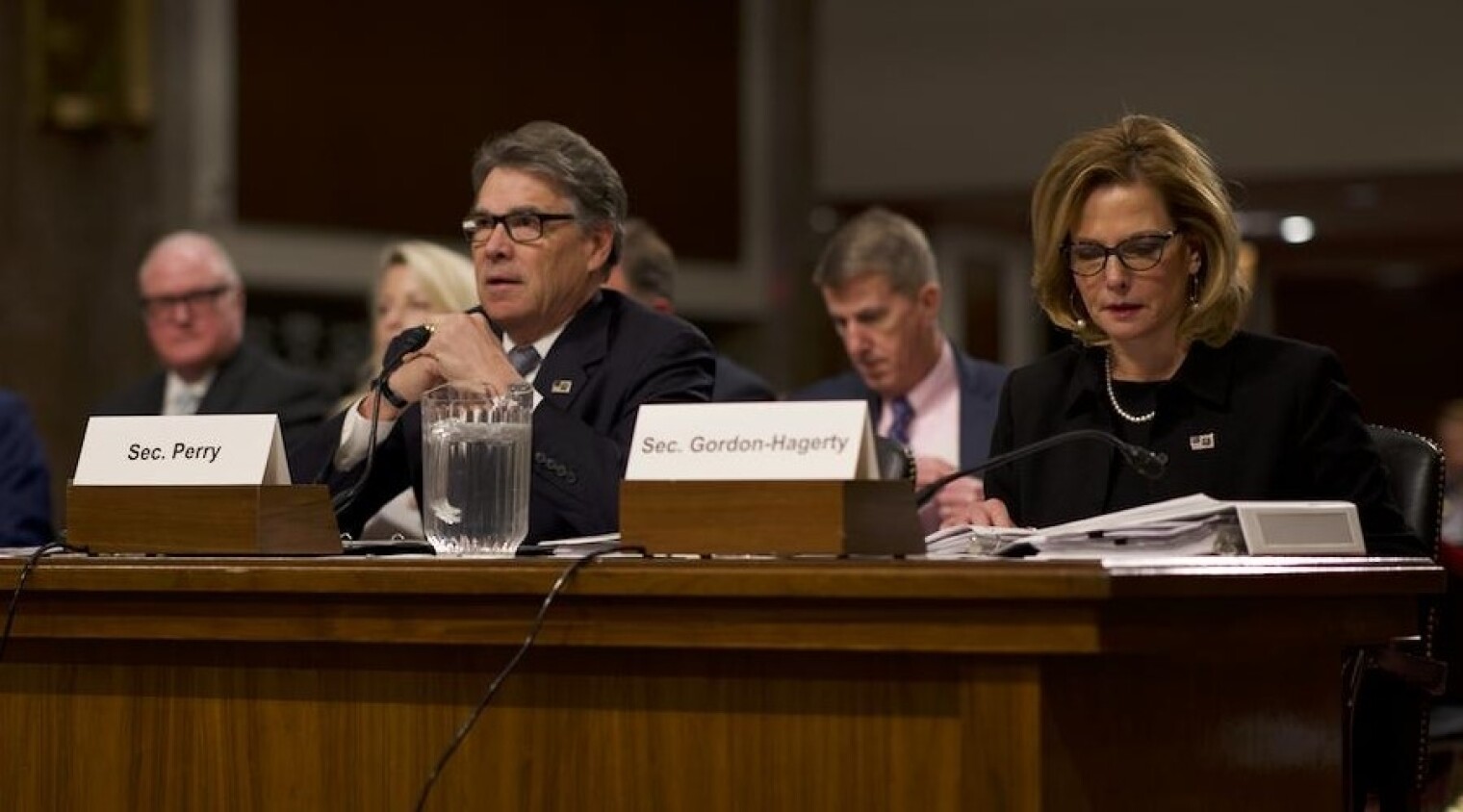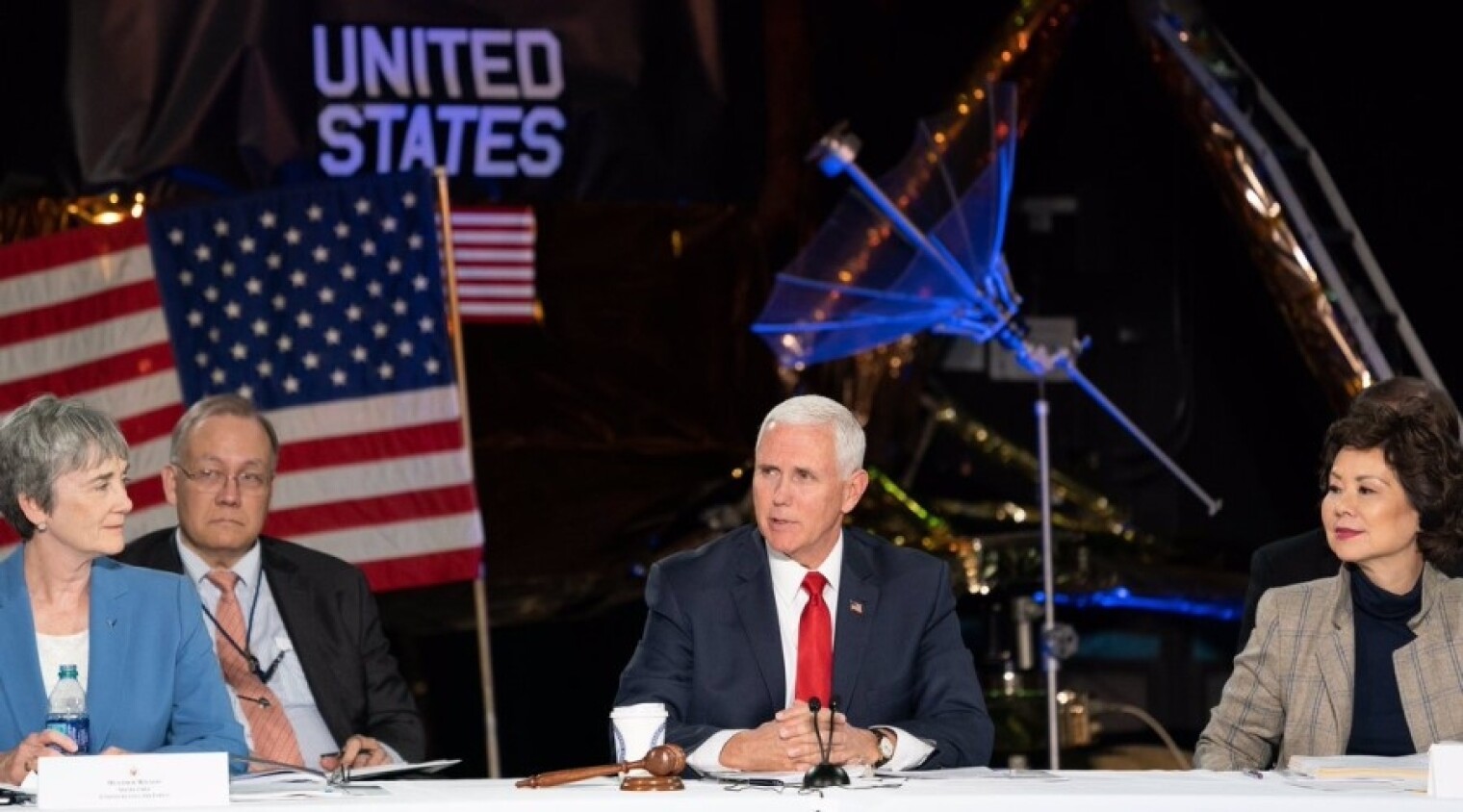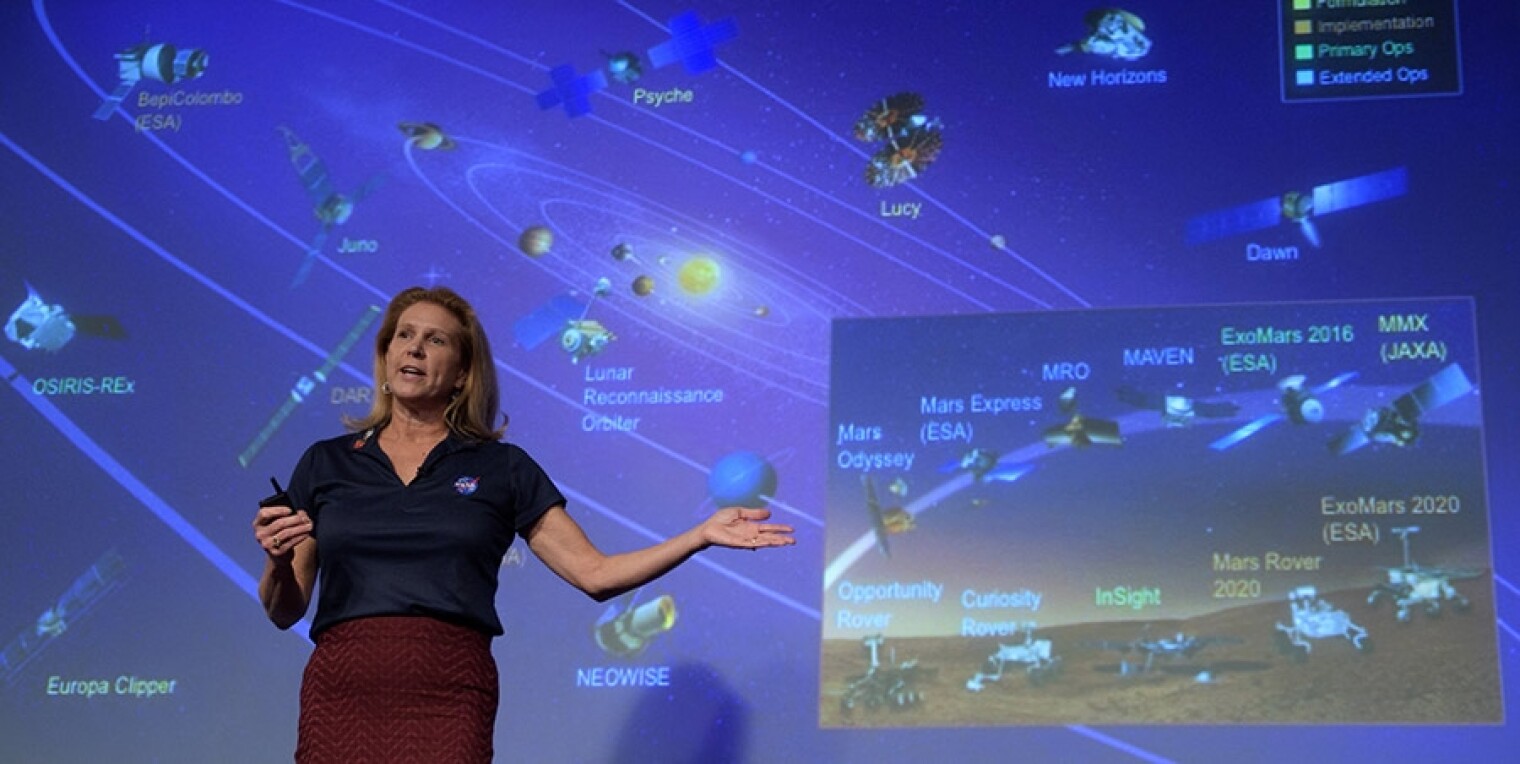| |
What’s Ahead
 |
| Energy Secretary Rick Perry, left, and NNSA Administrator Lisa Gordon-Hagerty will return to Capitol Hill this week to defend the president’s latest budget request. (Image credit - DOE) |
DOE Science and Nuclear Security Budgets Up For Review
Top officials from the Department of Energy are heading to Capitol Hill this week for another round of hearings on the president’s budget request for fiscal year 2020. Under secretaries Paul Dabbar and Mark Menezes will testify before the House Appropriations Committee on Wednesday about the proposals for the Office of Science, applied energy R&D offices, and the department’s nuclear waste cleanup activities. Meanwhile, top officials from the National Nuclear Security Administration will appear before the House and Senate Appropriations Committees on Tuesday and Wednesday, respectively. Energy Secretary Rick Perry will also return to the Hill for his fourth hearing of this budget cycle, testifying before the Senate Energy and Natural Resources Committee on Tuesday. In Perry’s previous hearings, Appropriations Committee leaders showed no interest in entertaining the administration’s proposed topline cuts to DOE’s research programs.
Science Committee to Examine NASA Budget Request
NASA Administrator Jim Bridenstine is appearing before the House Science Committee on Tuesday to defend NASA’s budget request for fiscal year 2020. Potential subjects of discussion include the Trump administration’s proposals to impose significant cuts on the Astrophysics and Earth Science Divisions, eliminate its Office of STEM Engagement, and cancel the Wide Field Infrared Survey Telescope. The committee will certainly address the administration’s announcement last week that it will land astronauts on the moon by 2024, four years ahead of the previous plan. In a statement to SpacePolicyOnline, Committee Chair Eddie Bernice Johnson (D-TX) noted the tension between the administration’s proposed cuts and its lunar ambitions, saying she looks forward to “hearing as to how NASA plans to do it and at what cost.” However, as Bridenstine explained last week at a House appropriations subcommittee hearing, detailed answers await the conclusion of a 45-day study the agency is conducting of its lunar program.
Other Science Agency Budget Hearings Also on Deck
The Appropriations Committees are also scheduled to review the budget requests for several agencies. National Institutes of Health Director Francis Collins will testify before the House Appropriations Committee on Tuesday alongside the directors of several NIH institutes. Later that day, NIST Director Walter Copan and Acting NOAA Administrator Neil Jacobs will appear alongside other Commerce Department officials at a Senate Appropriations Committee hearing. On Wednesday, U.S. Geological Survey Director Jim Reilly will testify at a House Appropriations Committee hearing on the Interior Department budget request.
NOAA Nominee and Various Research Bills Set for Committee Vote
The Senate Commerce, Science, and Transportation Committee will meet on Wednesday to consider several bills and presidential nominations, including that of Barry Myers to lead the National Oceanic and Atmospheric Administration. The committee previously approved Myers’ nomination on a party-line vote in January 2018, but the full chamber never considered it before the end of the last Congress. The president renominated Myers at the beginning of the current Congress. Democrats have opposed the nomination in part due to the potential conflict of interest posed by Myers’ deep connections to Accuweather, a private weather forecasting company from which he has since resigned and divested.
The committee will also vote on a set of reintroduced bills from the prior Congress that contain research provisions:
- The Space Weather Research and Forecasting Act would delineate federal agencies’ roles and responsibilities for space weather preparedness. The Senate passed the bill last Congress by unanimous consent but it stalled in the House Science Committee, which advanced a substantially different bill.
- The Space Frontier Act would streamline regulations associated with commercial launch and earth observation activities. It would also authorize the International Space Station to continue operations through 2030 and direct NASA to plan for a follow-on “national microgravity laboratory.” The new version of the bill reportedly does not contain the provisions that led to its failure in the House last year.
- The Coordinated Ocean Observations and Research Act would reauthorize NOAA’s Integrated Coastal and Ocean Observation System program. Committee Chair Roger Wicker (R-MS) and Ranking Member Maria Cantwell (D-WA) are the lead sponsors.
- The National Landslide Preparedness Act would direct the U.S. Geological Survey to establish a Landslide Hazards Reduction Program and expand early warning systems for flash floods in partnership with NOAA. Cantwell is again the lead sponsor of the bill along with Energy and Natural Resources Committee Chair Lisa Murkowski (R-AK).
|
|
In Case You Missed It
 |
| From left, Air Force Secretary Heather Wilson, National Space Council Executive Secretary Scott Pace, Vice President Mike Pence, and Secretary of Transportation Elaine Chao at the fifth meeting of the National Space Council. (Image credit – The White House) |
White House Pushes for Crewed Lunar Landing in 2024
At the March 26 meeting of the National Space Council, Vice President Mike Pence announced it is now Trump administration policy that NASA should land astronauts on the Moon within five years. While NASA had been planning a stepwise strategy leading to a crewed landing in 2028, it will now seek ways to push that date forward to 2024. Speculation has immediately turned to how NASA will meet that schedule and whether the administration will advocate for a large increase in funding for the agency. NASA Administrator Jim Bridenstine has announced one of the agency’s first moves will be to create a “Moon to Mars” Mission Directorate. It is not yet clear whether the new directorate would subsume lunar and Mars missions from the existing Science Mission Directorate. In any event, NASA has produced an updated mission timeline indicating its lunar plans still include beginning to construct an orbiting lunar outpost in 2022 and landing a Science and Exploration Rover in 2023.
White House Issues Space Weather Strategy, EMP Order
The Trump administration released a “National Space Weather Strategy and Action Plan” on March 26, updating a 2015 strategy developed during the Obama administration. The new strategy is organized around three high-level objectives: enhancing protections against space weather events, developing and disseminating timely characterizations and forecasts, and establishing plans to respond and recover. Such events, which include solar flares and winds, can induce damaging currents in electrical systems and disrupt the operations of satellites. While the strategy largely builds on prior efforts, through a separate action the administration has placed a new emphasis on preparing for human-caused electromagnetic pulses. The same day the strategy was released, President Trump signed an executive order prioritizing R&D to support the resiliency of critical infrastructure against both naturally occurring geomagnetic disturbances and electromagnetic pulses caused by the detonation of nuclear devices.
Droegemeier Previews Launch Policy Shift for Nuclear Spacecraft
Speaking at the National Space Council meeting last week, White House Office of Science and Technology Policy Director Kelvin Droegemeier said the White House plans to create a new “risk-informed process” for approving space missions that carry nuclear material. NASA uses radioisotopes as a fuel source for many of its missions to the outer planets as well as on its latest Mars rovers. It is also supporting the development of new fission-based technologies to propel spacecraft and power large extraterrestrial surface operations. The government currently has an elaborate process for approving such missions due to the potential for radioactive contamination from launch accidents. Droegemeier said a new standing interagency panel will be formed to assess such risks for government and commercial missions. He also said the new policy will direct the Department of Transportation to propose guidance for commercial entities interested in launching nuclear-powered space systems.
Key Appropriator Proposes ‘Manhattan Project’ for Clean Energy
Sen. Lamar Alexander (R-TN) proposed what he calls a “Manhattan Project” for clean energy last week, saying he wants to double federal funding for energy research and focus on ten “grand challenges” to create “breakthroughs in advanced nuclear reactors, natural gas, carbon capture, better batteries, greener buildings, electric vehicles, cheaper solar, and fusion.” Alexander chairs the Senate appropriations subcommittee responsible for the Department of Energy’s budget and recently announced he will not seek reelection in 2020. Since joining Congress in 2003, he has often advocated multiplying energy R&D budgets, and as recently as 2016 proposed funding such an effort by revoking the wind energy production tax credit. His new proposal comes as support for boosting energy R&D is gaining significant bipartisan traction in both chambers of Congress. These efforts might find backing from Senate Majority Leader Mitch McConnell (R-KY), who acknowledged the human role in climate change last week, while dismissing Democratic proposals to address it through a Green New Deal. “The way to do this consistent with American values and American capitalism is through technology and innovation,” he remarked.
Senate Democrats Establish Climate Panel
As Senate Republicans attack the Green New Deal, their Democratic colleagues have declared their intention to “remain on the offense” on climate change. On March 27, they established a 10-member Special Committee on the Climate Crisis chaired by Sen. Brian Schatz (D-HI) that will not have Republican members. The panel will conduct hearings and undertake other investigatory activities, but it will not be able to issue subpoenas or consider legislation. It will serve as a Senate counterpart to the House Select Committee on the Climate Crisis, which is holding its first hearing this Thursday on youth climate activism. Senate Minority Leader Chuck Schumer (D-NY) also introduced a bill last week that would block funding for any effort to “challenge the scientific consensus on climate change” as it is presented in the National Climate Assessment. The legislation responds to reports the White House is assembling an internal committee to scrutinize the assessment. Without the support of Senate Republican leadership, Schumer’s bill is unlikely to advance.
Advanced Nuclear Reactor Bills Reintroduced
On March 27, Senate Energy and Natural Resources Committee Chair Lisa Murkowski (R-AK) reintroduced the Nuclear Energy Leadership Act with the support of 14 other senators from both parties. Among its provisions, the bill directs the Department of Energy to demonstrate two advanced nuclear reactor concepts by the end of 2025 and at least two more by 2035. Both Murkowski’s bill and a House bill reintroduced by Rep. Bill Flores (R-TX) this month would also direct DOE to support the development of a domestic supply of high assay low enriched uranium (HALEU) for use in certain kinds of advanced reactors. The Senate and House bills build on legislation the previous Congress passed to support the development of new nuclear reactor designs. Meanwhile, DOE has been taking related steps on its own initiative, including issuing a contract earlier this year to spur domestic HALEU production and awarding a grant last week to Westinghouse Electric to pave the way toward demonstrating a microreactor design in 2022.
NASA Names Lori Glaze Planetary Science Director
 |
| Lori Glaze speaks at an October 2018 media briefing on the successful landing of the Mars InSight mission. (Image credit – NASA / Bill Ingalls) |
NASA Science Mission Directorate head Thomas Zurbuchen announced last week that Lori Glaze is officially taking on the role of Planetary Science Division director. She has been serving as acting director since NASA appointed her predecessor, Jim Green, as the agency’s chief scientist last May. Glaze holds bachelor’s and master’s degrees in physics from the University of Texas at Arlington and received her doctorate in environmental science from Lancaster University in the UK in 1994. An expert in planetary volcanology, she spent much of her career at Proxemy Research, a small private research firm, before joining the NASA Goddard Space Flight Center in 2007. Glaze has worked on several concept studies for missions to Venus and chaired NASA’s Venus Exploration Analysis Group from 2013 to 2017. She led Goddard’s Solar System Exploration Division for four years and directed its Planetary Geology Laboratory for one before moving to NASA Headquarters last year.
NASA Suspends Search for Earth Science Division Director
Zurbuchen also announced last week that NASA has called off its search for a successor to Mike Freilich, who retired a month ago as director of the Earth Science Division. Citing a failure to find a candidate possessing a “full set of qualifications,” Zurbuchen indicated NASA would reopen its call for candidates in “approximately a year or so.” In the meantime, Deputy Division Director Sandra Cauffman will continue in her current role as acting director and division scientist Paula Bontempi will now act as deputy director.
|
|
Events This Week Monday, April 1
Tuesday, April 2
NDIA: Science and Engineering Technology Conference (continues through Thursday) San Diego, CA STEM on the Hill: Science, Engineering, and Technology Congressional Visit Day (continues Wednesday) Senate: DOE budget request hearing 10:00 am, Energy and Natural Resources Committee (366 Dirksen Office Building) House: NASA budget request hearing 10:00 am, Science Committee (2318 Rayburn Office Building) House: NIH budget request hearing 10:00 am, Appropriations Committee (2358-C Rayburn Office Building) House: EPA budget request hearing 10:00 am, Appropriations Committee (2359 Rayburn Office Building) House: “Lessons from Across the Nation: State and Local Action to Combat Climate Change” 10:00 am, Energy and Commerce Committee (2123 Rayburn Office Building) House: “How Climate Change Threatens U.S. National Security” 10:00 am, Foreign Affairs Committee (2172 Rayburn Office Building) Senate: “Oversight of the Nuclear Regulatory Commission” 10:00 am, Environment and Public Works Committee (406 Dirksen Office Building) Hudson Institute: “Artificial Intelligence and Quantum Technology: Implications for U.S. National Security” 11:45 am - 1:30 pm, Hudson Institute (1201 Pennsylvania Ave. NW, DC) Senate: Commerce Department budget request hearing 2:00 pm, Appropriations Committee (G50 Dirksen Office Building) House: “Roundtable Briefing on the S&T Directorate’s Use of the Small Business Innovation Research Program” 2:00 pm, Homeland Security Committee (310 Cannon Office Building)
Wednesday, April 3
National Academy of Sciences: “Advancing the Science and Practice of Science Communication: Misinformation about Science in the Public Sphere” (continues Thursday) Beckman Center (Irvine, CA) Video will be posted after event National Academies: “Review of Progress Toward Implementing the Solar and Space Physics Decadal Survey,” meeting two (continues through Friday) Laboratory for Atmospheric and Space Physics (Boulder, CO) Webcast available House: “Generation Climate: Young Leaders Urge Climate Action Now” 9:00 am, Climate Crisis Committee (2318 Rayburn House Office Building) Senate: EPA budget request hearing 9:00 am, Appropriations Committee (124 Dirksen Office Building) Senate: Commerce Committee Executive Session Meeting 9:30 am, Commerce, Science, and Transportation Committee (G50 Dirksen Office Building) CSIS: “The Future of Arms Control” 1:00 - 6:00 pm, CSIS headquarters (1616 Rhode Island Ave. NW, DC) House: USGS budget request hearing 1:00 pm, Appropriations Committee (2008 Rayburn Office Building)
House: DOE Science, Energy, and Environmental Management budget request hearing 1:45 pm, Appropriations Committee (2362-B Rayburn Office Building) House: Commerce Department budget request hearing 2:15 pm, Appropriations Committee (H-309 Capitol Building) Senate: “Trailblazers and Lost Einsteins: Women Inventors and the Future of American Innovation” 2:15 pm, Judiciary Committee (226 Dirksen Office Building) Senate: NNSA budget request hearing 2:30 pm, Appropriations Committee (138 Dirksen Office Building) House: “Missile Defense Policies and Programs” 2:30 pm, Armed Services Committee (222 Russell Office Building) House: “Reviewing DOD Strategy, Policy, and Programs for Countering Weapons of Mass Destruction” 2:30 pm, Armed Services Committee (2212 Rayburn Office Building) ClearPath/DOE: “Advanced Nuclear Public Policy Momentum in Congress,” congressional briefing 2:30 - 4:00 pm, G-50 Dirksen Senate Office Building JHU SAIS: “An International Perspective on S&T Diplomacy” 4:00 - 6:00 pm, John Hopkins University Rome Building (1619 Massachusetts Ave. NW, DC) AIP: “Freedom’s Laboratory: The Cold War Struggle for the Soul of Science” 5:30 - 7:30 pm, American Institute of Physics (College Park, MD)
Thursday, April 4
Friday, April 5
Monday, April 8
|
|
Opportunities National Academies Hiring Army R&D Expert
The National Academies is seeking a scholar with broad experience in science and technology areas of interest to the U.S. Army. Applicants must have a PhD and at least twelve years of experience in a relevant field.
AGU Hiring Summer Public Affairs Intern
The American Geophysical Union is accepting applications for its summer public affairs internship program. The intern will attend congressional events and assist the public affairs team in organizing the Geoscience Congressional Visits Day, among other responsibilities. Applicants must have completed at least two years of coursework towards a degree in Earth or space sciences.
AAAS Science and Human Rights Essay Contest Open
The American Association for the Advancement of Science invites submissions from undergraduate and graduate students for its essay competition on connections between human rights and science, engineering and the health professions. Submissions are due April 30.
Know of an upcoming science policy opportunity? Email us at fyi@aip.org.Know of an upcoming science policy event? Email us at fyi@aip.org.
|
|
Around the Web
News and views currently in circulation. Links do not imply endorsement.
White House
Congress
Political Engagement
Science, Society, and the Economy
Education and Workforce
Research Management
Labs and Facilities
Energy
Quantum Science and Technology
Space
Weather, Climate, and Environment
Defense
Biomedical
International Affairs
|
|
|
| |
| |
|
